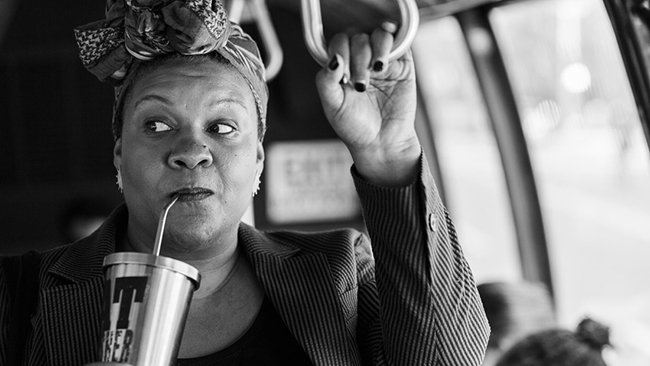
Josh Reviews The 40-Year-Old Version
Radha Blank wrote, directed, produced, and stars in in The 40-Year-Old Version, a film that I loved and included on my list of my favorite movies of 2020. This wonderfully off-beat and moving film centers on a fictionalized Radha Blank. Despite her early success as a playwright, now that Radha is in her forties, she is feeling lost and unmoored. Things start to change when she unexpectedly finds herself drawn into the word of hip-hop and rhyming, and she starts performing under the name RadhamMUSPrime (a name that made this long-time Transformers fan smile).
While the movie’s title is a play on Judd Apatow’s The 40-Year-Old Virgin, this film has nothing to do with Mr. Apatow’s film. It tells a completely different, original story. (Actually, the title is my least favorite aspect of the film. This is such a deeply unique film, I think the derivative title does it a disservice. I can understand why they might have thought the title would help get this movie noticed — and very likely it did!! — but I think it does a poor job of conveying what this wonderful film is all about.)
Ms. Blank is spectacular in the film. She’s a tremendous comedic force, and she’s also a very strong dramatic actor. The film allows both sides of her to shine. There are some terrifically goofy, silly comedic moments in the story, particularly in the first half, and I was immediately taken by how wonderfully Ms. Blank played those moments. She’s very funny! And then I was impressed again when she was able to pivot into more soulful, contemplative moments.
Those tonal shifts can be challenging, and there were some moments in the first half hour in which I found myself wondering what kind of movie this was going to turn out to be. But in the end, I wound up loving both aspects of the film. I love how silly the film is at times, and yet how at the same time, as the film unfolds, it’s a delight to see how it develops into a very deep character study. I love Ms. Blank’s boldness in creating a film that would be so audacious in pushing both areas, the silliness and the drama. She clearly wasn’t afraid to shift between those very different tones. The result is a film that is a remarkable showcase for her talents in both areas.
The film feels deeply personal. The story is fictional, but Ms. Radha was able to take many autobiographical aspects of her own life and spin them into this story. When artists create and play characters who have the same name as they do in real life, it invites speculation as to what is real and what is made up, and how close the character we’re watching on screen is to who they actually are in real life. This can be a fun game to play. When done well, this approach can be a useful shortcut to making a film feel real, to feel intimate and personal. Combined with Ms. Blank’s engaging persona, this works very well here. (You can read more about the autobiographical aspects of the film’s story here.)
I was fascinated by the way the film explored issues of identity and representation, and questions about how to succeed without selling out, and how to tell Black stories in a way that is authentic and not pandering. It’s not too hard to guess that Ms. Blank has faced and pondered those questions during her life and career, and also likely in the creation of this very film. I was impressed with how she was able to thread the needle of exploring those issues both through the story of the fictionalized Radha. To me, some of the most wrenching parts of the film were the sequences in the second half, in which we see Radha start to feel that she is losing the truth of the play that she wrote, and has finally succeeded in getting staged, as white liberals chip away at it.
Ms. Blank’s co-stars are great. I was extremely taken by Oswin Benjamin’s soulful work as D, the beat maker with whom Radha starts working when she begins to dip her toes into the idea of making music. D is not very talkative. That’s putting it mildly. But Mr. Benjamin is able to convey a universe of depth, despite his character’s near-silent (especially when compared to the very talkative Radha) nature. It’s a wonderful performance. Peter Kim is very funny as Radha’s long-suffering agent, and long-time friend, Archie. And I absolutely adored all of the kids in the drama class that Radha (somewhat reluctantly) teaches, especially Imani Lewis and Haskiri Velazquez.
The film is shot in black and white. It’s yet another bold choice in the film. For me, it pays off well. Cinematographer Eric Branco photography is gorgeous. The black and white approach gives the film a distinct look. It also creates a favorable connection in my mind to other films, shot in black and white, that were so iconically set in New York City, films such as Spike Lee’s She’s Gotta Have It, and Woody Allen’s Manhattan, and also Martin Scorsese’s Raging Bull. There’s a lovely through-line that visually connects The 40-Year-Old-Version to those illustrious predecessors.
I always appreciate films that feel like they are expressing a personal and unique vision. The 40-Year-Old Version is definitely that. If you haven’t seen it, give it a chance!
The photo at the top of this post is by Eric Branco, Courtesy of Sundance Institute.
Click here to purchase my “Maclunkey” Star Wars/Highlander mash-up t-shirt!
Please support MotionPicturesComics.com by clicking through one of our Amazon links the next time you need to shop! As an Amazon Associate, I earn from qualifying purchases. That means I’ll receive a small percentage from any product you purchase from Amazon within 24 hours after clicking through. Thank you!

